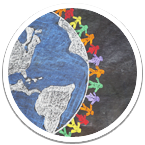Part 6: Polarisation, hate speech and relations
In part six, Work Counsellor, Mediator, Master of Arts (Education), and Master of Social Sciences Miriam Attias discusses conflict situations, hate speech, and polarisation.
There are plenty of situations in anti-racist work that are prone to conflicts. Any actions based on hate pose a direct threat to a person’s identity and existence, because the person is targeted simply because they belong to a certain group. In turn, polarisation produces and reinforces group identities. According to Attias, the two most important tools in any conflict situation are an open and curious attitude and impartiality. Moreover, the best way to support and help someone is to listen and take both parties seriously. Sometimes radical listening is the best thing you can do or give to another person.
Materials supporting learning
See the slideshow by Miriam Attias (pdf 2,3 MB)
Key concepts:
- hate speech
- polarisation
- radical listening
- open curiosity
- cultured conflict
- prejudice
Read more about the key concepts.
Reflect on the following questions:
- What is radical listening, and why is it useful?
- What are the different stages of a conflict?
- How can you express your impartiality when resolving a conflict?
- How is the polarisation that exists in the society visible in your work or studies?
- What is the difference between hate speech and angry speech?




